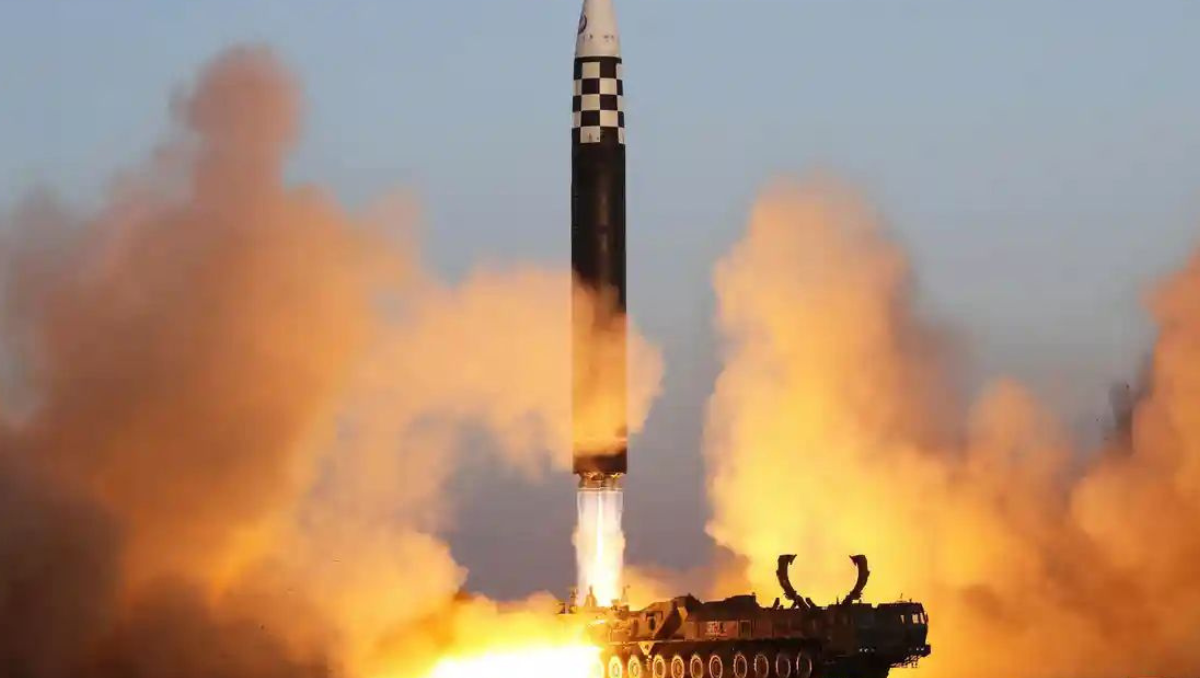On Monday, Pyongyang conducted the launch of a missile described as ‘ICBM-class,’ following the testing of a short-range weapon earlier the same day, marking a record year of testing.
Table of Contents
About North Korea
North Korea, officially called the Democratic People’s Republic of Korea (DPRK), is a country in East Asia. Led by Kim Jong-un, it’s known for strict government control.
The nation is often isolated from the world, with limited information reaching outside. North Korea has faced economic challenges and relies on industries like agriculture. Its nuclear program has led to international concerns and sanctions.
Everyday life is highly regulated, and citizens have limited access to global communication. The Korean War in the 1950s left the country divided, and tensions persist on the Korean Peninsula.
All about the missile launch
North Korea has recommenced its prolific year of missile trials, firing a long-range ballistic missile that has the capability to reach the United States. This follows shortly after launching a short-range weapon. The international community, including neighboring countries, condemned these actions as a threat to global peace.
On Monday, South Korea‘s military reported the launch of a long-range ballistic missile from the Pyongyang region. The missile traveled approximately 1,000km before landing in the East Sea, also known as the Sea of Japan.
Japan’s Ministry of Defense has identified the recent missile launch as an intercontinental ballistic missile (ICBM) with the potential to reach any location in the United States. According to Shingo Miyake, the parliamentary vice minister of defense, the ICBM-class ballistic missile, based on trajectory calculations and warhead weight, could cover a flying range exceeding 15,000km.
The missile, initially categorized as short-range, originated from the Pyongyang area and was directed towards the waters between the Korean Peninsula and Japan. South Korea reported that the test occurred at approximately 10:38 pm, covering a distance of about 570km before landing in the ocean.
Responding to the situation, Japan’s Prime Minister Fumio Kishida swiftly convened a meeting of the National Security Council, condemning the launches. He characterized them as “not only a clear violation of UN Security Council resolutions but also a threat to the peace and stability of the region.”
South Korea has expressed deep concern, labeling the recent missile launches as a “serious incitement” endangering global peace. These consecutive launches occurred subsequent to an agreement between South Korea and the US to enhance their collaborative nuclear deterrence capabilities, responding to the evolving nuclear threats posed by North Korea.
Throughout this year, Pyongyang has conducted an unparalleled number of weapons tests and successfully deployed a reconnaissance satellite, aligning with the strategic initiative led by Kim Jong Un to modernize North Korea’s military capabilities.
The US military has emphasized that the launch underscores the destabilizing impact of North Korea’s unauthorized weapons program.
White House National Security Advisor Jake Sullivan engaged in discussions with his South Korean and Japanese counterparts. During these talks, he emphasized the significance of mutual sharing of missile warning data, according to the White House.
The recent test on Monday marked the fifth Intercontinental Ballistic Missile (ICBM) trial this year and the initial one since July, during which North Korea conducted the launch of the Hwasong-18. Launched for the first time in April, the Hwasong-18 represents North Korea’s inaugural use of solid fuel in an ICBM, enhancing transport convenience and accelerating the launch process compared to liquid-fueled counterparts.
South Korea is currently in the process of analyzing Monday’s launch to determine whether it involved a solid-fuelled ICBM.
United Nations Security Council (UNSC) resolutions prohibit all ballistic missile activities conducted by North Korea. However, Pyongyang maintains that these activities are within its sovereign right to self-defense.
The recent missile launches coincide with North Korea’s commemoration of the anniversary of the death of leader Kim Jong Un’s father and predecessor, Kim Jong Il, who passed away on December 17, 2011.
In the previous year, North Korea declared itself an “irreversible” nuclear power and consistently asserts its commitment to retaining its nuclear program, considering it a crucial element for the regime’s survival. The United Nations Security Council (UNSC) has issued numerous resolutions urging North Korea to cease its nuclear and ballistic missile initiatives, and it has imposed severe sanctions since the country’s initial nuclear test in 2006.
Concurrently, Washington and its partners have expressed great worries regarding an increased military collaboration between Pyongyang and Moscow. These concerns escalated following Kim’s visit to Russia, where he met with President Vladimir Putin in September.
There is a growing unease that Kim might be supplying essential munitions to support Putin’s ongoing conflict in Ukraine, receiving Russian technological aid in return to bolster his own modernization initiatives.
